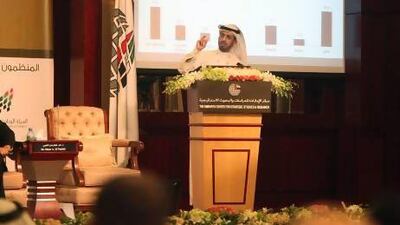ABU DHABI // A survey of migrant workers in the UAE has found that 63 per cent of earnings are sent home - an average of Dh10,000 each annually.
The UAE University poll of four major labour-sending countries also revealed that 60 per cent of respondents thought they were better off for moving to the UAE.
The study, which was conducted at the end of last year, is the first to include workers still in the country and those who left after several years, and it included workers from various industries, from unskilled to skilled.
A total of 974 expatriates from India, Pakistan, Bangladesh and the Philippines took part, according to Dr Omar Al Nuaimi, an assistant professor for business and economics at the university, who spoke on the sidelines of the conference yesterday.
"This study is aimed at understanding the situation of temporary workers in the UAE. For this purpose, workers from India, Bangladesh, the Philippines and Pakistan were surveyed," Dr Al Nuaimi said.
He said many of the workers polled come to the UAE without any training and they were earning about Dh200 to Dh250 a month in their homeland, a figure that was multiplied by an average of five times on arrival here. "About 45 per cent of workers have debts before coming to the UAE, more than 70 per cent claimed their skills improved while in the UAE and 40 per cent were able save money in the first six months," Dr Al Nuaimi said.
Newcomers were often helped by relatives already working here, the study found, and relatives in the home countries spent about 80 per cent of the remitted money on meeting their basic needs, with a very small amount spent on education and other needs.
"The cost of migration is lowest among Filipinos, despite receiving the highest salary while in their country," Dr Al Nuaimi added. "The highest migration cost is borne by the Bangladeshis while they receive the lowest salary. It is thought that this is the effect of competition, which is rather fierce in Bangladesh compared with the Philippines."
Once here though, Bangladeshis' remittances are hugely important for those at home, according to Dhaka University professor of international relations, refugee and migratory movements, Dr Chaudhury Rafiqul Abrar.
"The remittance inflow to Bangladesh was further augmented in the past year when Bangladeshi migrant workers set a record by remitting US$14.2 billion (Dh52.2bn) in a single year," he said.
Dr Abrar added that, over the past 37 years, the GCC has accounted for more than 78 per cent of the total flow of Bangladeshi workers overseas, with 31 per cent in Saudi Arabia and 27 per cent in the UAE.

